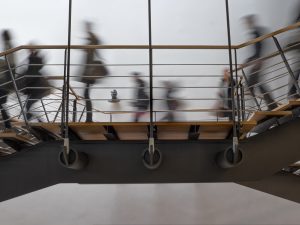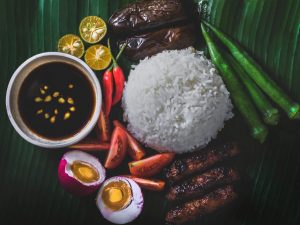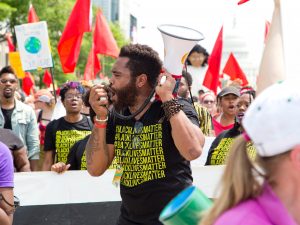As I took my first steps outside of the airport, the humidity slapped my face, overwhelming me with its presence. It quickly dawned on me that it’s not just the people in Africa who are generous and welcoming. The weather that welcomed me back that fateful day made it abundantly clear that I wasn’t in Canada anymore. Nevertheless, something in me had shifted. It was in the way the red dirt roads embraced the soles of my shoes, the way my uncle’s welcoming and warm embrace steadied me, the ride to my family’s compound…it had been fifteen years in the making, but I had finally made it back home. Cameroon, how I had missed you.
I was born in Cameroon, raised in America, but really came of age in Canada. And that short trip back home when I was 20 re-ignited a fire within me—a fire that led to questioning my identity and sense of belonging.
Who am I? How do all these cultures shape me? Where does my faith fit in?
Let me share with you my journey of exploring my identity as a third-culture kid.
A childhood transitioned
At the tender age of five, my biggest adventure to date began. I remember my first airplane ride like it was yesterday. When you’re the youngest child, your voice often isn’t the biggest in the room (I don’t think I would have had much to say at that point in life anyway, to be perfectly honest). So when my parents said we were going to the airport, all I knew to do was hold my mom’s hand and not cause any trouble. As I sat on the airport bench, I was unfazed. As custom would have it, family members had accompanied us to the airport. Boarding time neared, final hugs were given and goodbyes lingered in the air. I was just excited to get on the plane. I didn’t think this would be the last time I would see them. You never really think about your interaction with someone as being the last one.
We had somehow managed to get first-class seats. I recall my five-year-old body drowning in the large seat. The hostess brought me peanuts and thus my adventure began. Little did I know that what awaited me on the other side of the ocean was going to be a life-long battle of trying to piece together who I truly was and where I really belonged.
Liminal teen years
The mist of the cool morning kissed my face as I stepped out, forcing my body out of my teenage lethargy and awakening me to the day’s possibilities. As I made my way to the car, my dad, Pops, began his speech that had become a morning routine: “Never forget, my daughter, you come from West Africa, Cameroon. You are from the Bangou tribe. You are not African American… Because you are black, you will always be expected to do twice as much to just get half… Excellence is not requested, it is required.” I quickly learned what Pops meant by that–we had gone from being in a space where wherever you turned, you would see someone who looked like you, to being thrust in a space heavy with over 400 years of history that put people with my skin colour at a severe disadvantage… to say the least.
My family and I had been in the United States of America for about eight years now. We had moved to America’s “Bible belt” and the home of Southern hospitality. Nevertheless, Pops wouldn’t let any of his kids forget their roots. Our days started and ended with worship and prayer as we acknowledged the hand of God over our lives. Life outside of our four walls was filled with soccer games, violin lessons, and a lot of English. However, the moment we stepped into our home, not a lick of English was allowed to be spoken. This was the only way we could keep speaking French (we were Francophone Cameroonians), as well as our native languages.
However, the older I became, the more lines got blurred. I so desperately wanted to just fit in. I wanted friends that I could hang out with. But it seemed like no matter where I turned I was being reminded that my desire would not be fulfilled. At home, I was reminded that I’m not African American. At school, I was teased for being African. It’s no wonder I lost myself in books, where I could create my own reality and, even for a moment, be seen.
Awakening in the Diaspora
Everything changed when I was sixteen. As the thought of university lurked around the corner, I made another big move, this time to Canada. I was now surrounded by other diasporic kids, and interestingly enough, despite all the reminders that I wasn’t American, my new-found Canadian friends gravely disagreed. But they also understood. They understood my situation like I understood theirs.
Nigerian poet Ijeoma Umebinyuo articulates it well: “So, here you are, too foreign for home, too foreign for here. Never enough for both.”
Despite that, I sought community amongst other Cameroonians. Each person’s story was different. Some had been able to go back home during the summers, while others, like me, had not been back in years. Though I still felt a bit out of place, I didn’t feel as alone as I did in the States. Surprisingly, there was still a culture shock that I had to navigate. I went from being the only “diverse” person in my predominantly white classes to being in the midst of one of the most diverse cities in Canada. However, slowly but surely, I adapted. The days came and went. I made friends amongst my fellow Cameroonians but also with other immigrant kids (well, technically, unless you’re First Nations we are all immigrants, but that’s another story for another article). I realized that every part of my story, good or bad, shaped my identity; it didn’t have to be based off of an “or,” it could be full of “ands.” I am Cameroonian AND of the diaspora.
It was fifteen years later when I took my first trip back to Cameroon; that was also the year I was set to start university. Two big milestones in one year, talk about overwhelming. As I travelled, my anxiety and excitement played tag with each other. But nothing could have prepared me for what was waiting for me on the red ground. As we drove to my family’s compound, and I took in the night sky populated with stars big and small, I was filled with an overwhelming feeling of “home.” This was once the only place that five-year-old Josie knew. A lot had changed since having first left–a full life had been lived; but suddenly, in the back seat of that car, I couldn’t help but imagine what life would have been like if I had stayed.
My stay was short but effective. Re-meeting all my extended family members and visiting my parents’ villages fuelled something in me that remains unquenched. There were many moments where I didn’t understand why something was done. And at this point, my tongue wasn’t a home for my native language anymore, leaving me unable to fully express myself. However, my family extended grace. Though I was from “the abroad,” I was still theirs.
A woman defined
I returned to Canada invigorated. To have seen where my parents call home and where my story started humbled me. Having the opportunity to look back brought more context to the journey to present day. It all began to make sense…why my parents moved to begin with. However, it didn’t simply rid me of my struggles with identity right then and there. Rather, it provided me with tools to understand how to navigate this struggle.
In moments of my greatest struggle, I remember God’s words to Jeremiah: “Before I formed you in the womb I knew you, before you were born, I set you apart.” (Jeremiah 1:5)
To ultimately be seen, be deeply known, and defined by the Creator provides the deepest comfort. In my moments of deep questioning, knowing that God has orchestrated each unique detail of my life, in a way that will help give him glory, gives me assurance and stability. I can trust that he knew what he was doing when he allowed me to be born in Cameroon, raised in the States, and residing in Canada. He knew that the culture clashes with my parents would arise. In the process, it was difficult to believe that God was in control, but a slow and thoughtful look back at the events in my life clearly points to a divine hand over my life–and my family’s journey.
Starting from the beginning, God was at work. God led my dad to connect with the African American lady who would be the bridge between our two continents, facilitating our move. This phenomenal and courageous woman led many Cameroonians (and West Africans) to America in a time when living in one’s home country was not a sufficient option anymore. She recently passed away, but her impact remains in the generations of families whose lives have been changed because she advocated for them to have a chance in a new world. (May she rest in peace.) The move from the States to Canada allowed my sister to meet the doctor who would heal her of the ulcers that had plagued her for over seven years. God was active in my trip back to Cameroon, revealing a passion in me that I had yet to explore: reshaping the continent’s narrative through storytelling.
I’m now learning that my identity ultimately isn’t defined by the places I’ve lived but in relation to who God is. He is my heavenly father and I am his child. I belong to him fully first and foremost, whereas parts of who I am also belong to Cameroon, the US, and Canada.
As I grow deeper with Jesus, the more I realize that this world is not our home and borders are a man-made construct. Yet we’ve attached so much meaning to them. I’m thankful that I’m a part of such a rich cultural heritage, however, I’m even more grateful to be a part of God’s kingdom. A kingdom that welcomes you no matter where you come from, one that makes space for you to fit in…to belong. A belonging that will last for eternity, when Jesus returns to establish the new heavens and new earth.
This article was written as part of the Writing Mentorship with our P2C-Students Editorial team.
"*" indicates required fields
Share this!
About the Author





